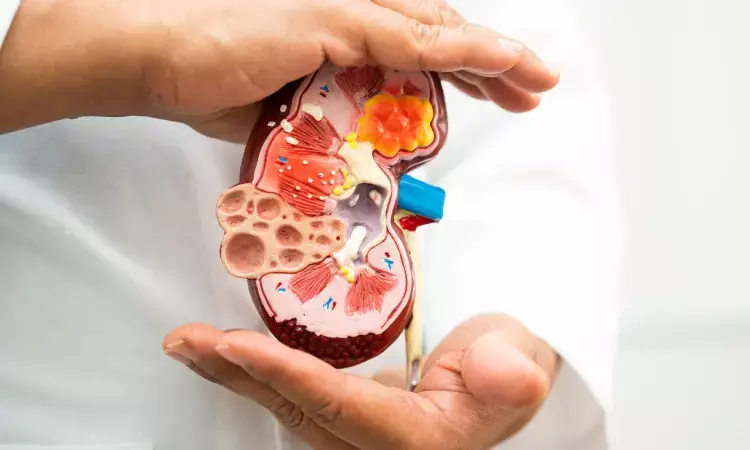- Home
- Medical news & Guidelines
- Anesthesiology
- Cardiology and CTVS
- Critical Care
- Dentistry
- Dermatology
- Diabetes and Endocrinology
- ENT
- Gastroenterology
- Medicine
- Nephrology
- Neurology
- Obstretics-Gynaecology
- Oncology
- Ophthalmology
- Orthopaedics
- Pediatrics-Neonatology
- Psychiatry
- Pulmonology
- Radiology
- Surgery
- Urology
- Laboratory Medicine
- Diet
- Nursing
- Paramedical
- Physiotherapy
- Health news
- Fact Check
- Bone Health Fact Check
- Brain Health Fact Check
- Cancer Related Fact Check
- Child Care Fact Check
- Dental and oral health fact check
- Diabetes and metabolic health fact check
- Diet and Nutrition Fact Check
- Eye and ENT Care Fact Check
- Fitness fact check
- Gut health fact check
- Heart health fact check
- Kidney health fact check
- Medical education fact check
- Men's health fact check
- Respiratory fact check
- Skin and hair care fact check
- Vaccine and Immunization fact check
- Women's health fact check
- AYUSH
- State News
- Andaman and Nicobar Islands
- Andhra Pradesh
- Arunachal Pradesh
- Assam
- Bihar
- Chandigarh
- Chattisgarh
- Dadra and Nagar Haveli
- Daman and Diu
- Delhi
- Goa
- Gujarat
- Haryana
- Himachal Pradesh
- Jammu & Kashmir
- Jharkhand
- Karnataka
- Kerala
- Ladakh
- Lakshadweep
- Madhya Pradesh
- Maharashtra
- Manipur
- Meghalaya
- Mizoram
- Nagaland
- Odisha
- Puducherry
- Punjab
- Rajasthan
- Sikkim
- Tamil Nadu
- Telangana
- Tripura
- Uttar Pradesh
- Uttrakhand
- West Bengal
- Medical Education
- Industry
Research non committed about benefit of Vadadustat for symptomatic anaemia associated with CKD: a missed opportunity

Patients with symptomatic anaemia associated with chronic kidney disease who are on chronic maintenance dialysis can now also receive vadadustat instead of an erythropoiesis-stimulating agent such as darbepoetin. The German Institute for Quality and Efficiency in Health Care (IQWiG) has now examined in an early benefit assessment whether the new drug offers an added benefit for these patients in comparison with the appropriate comparator therapy (ACT). The (German-language) report was published in September 2024, an English translation in November 2024.
No overall advantage or disadvantage of vadadustat can be established based on the available results of the two studies cited by the manufacturer in its dossier; individual positive and negative effects can be seen in side effects. An added benefit of vadadustat in comparison with the ACT is therefore not proven.
Studies with virtually no informative benefit outcomes
Anaemia is often accompanied by symptoms such as fatigue, dizziness, headache and physical weakness. The resulting reduction in physical performance also has an impact on patients’ quality of life. However, informative outcomes on symptoms and outcomes in the health-related quality of life category were not recorded in the studies. It therefore remains unknown what effect the consistently lower haemoglobin levels during treatment with vadadustat have on the patients’ wellbeing.
In smaller studies, the results of which were not included in the benefit assessment, the manufacturer had previously asked patients about their wellbeing, thus demonstrating that patient-reported outcomes can and should be recorded during treatment with vadadustat. Daniela Preukschat, who heads the Chronic Diseases Division in IQWiG’s Drug Assessment Department, says: “The study data used for the benefit assessment say nothing about how patients feel during and after treatment. It would have been perfectly feasible to record patient-relevant outcomes. The opportunity was missed to collect important data for patients and treatment decisions.”
G-BA decides on the extent of added benefit
The dossier assessment is part of the early benefit assessment according to the Act on the Reform of the Market for Medicinal Products (AMNOG) supervised by the G-BA. After publication of the dossier assessment, the G-BA conducts a commenting procedure and makes a final decision on the extent of the added benefit.
Reference:
Vadadustat (symptomatic anaemia associated with dialysis-dependent chronic kidney disease); Benefit assessment according to §35a SGB V, IQWiG (2024). DOI: 10.60584/a24-67_en.
Dr Kartikeya Kohli is an Internal Medicine Consultant at Sitaram Bhartia Hospital in Delhi with super speciality training in Nephrology. He has worked with various eminent hospitals like Indraprastha Apollo Hospital, Sir Gangaram Hospital. He holds an MBBS from Kasturba Medical College Manipal, DNB Internal Medicine, Post Graduate Diploma in Clinical Research and Business Development, Fellow DNB Nephrology, MRCP and ECFMG Certification. He has been closely associated with India Medical Association South Delhi Branch and Delhi Medical Association and has been organising continuing medical education programs on their behalf from time to time. Further he has been contributing medical articles for their newsletters as well. He is also associated with electronic media and TV for conduction and presentation of health programs. He has been associated with Medical Dialogues for last 3 years and contributing articles on regular basis.


